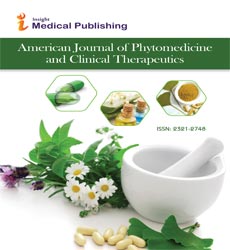ISSN : 2321-2748
American Journal of Phytomedicine and Clinical Therapeutics
Editorial Note on Genome-wide Examination Relates Ayurveda Prakrit
Edwards*
Department of Agro-Environmental and Biological Sciences, Vila Real, Portugal
- *Corresponding Author:
- Edwards
Department of Agro-Environmental and Biological Sciences, Vila Real, Portugal
Received Date: October 08, 2021; Accepted Date: October 15, 2021; Published Date: October 22, 2021
Citation: Edwards (2021) Editorial Note on Genome-wide Examination Relates Ayurveda Prakriti. Am J Phytomed Clin Ther Vol.9 No.10:47
Editorial
Among the traditional systems of medicine practiced all over the world, Ayurveda of India has a documented history dating back to 1500 BCE. Though contemporary medicine is currently the mainstream of medical practice in India, Ayurveda is extensively used side by side and remains highly popular, especially in South Asia. The basic concepts of Ayurveda are-five elements – panchabhuta – which constitute the physical universe including the human body and three doshas (Vata, Pitta and Kapha) or constitutional types of every human. These doshas refer broadly to the functions of motion, digestion and cumulation.
Though all three doshas exist in every human being one is dominant based on which an individual’s Prakriti is determined. Prakritis are discreet phenotypes and they are determined on the basis of physical, psychological, physiological and behavioural traits and independent of social, ethnic and geographical variables the etymology of these Sanskrit terms suggests that Vata originates from movement, Pitta from digestion and Kapha from cumulation. Since Prakritis underlie an individual’s predisposition to disease as well as response to treatment, it is imperative in Ayurvedic practice to identify the Prakriti of a patient before treatment
Concept of Prakriti in Ayurveda and its relationship with genomics was hypothesized over a decade ago. Subsequent studies have attempted to correlate Prakriti classification with genetic information and association of Single Nucleotide Polymorphisms (SNPs) in HLA-DRB1, CYP2C19, EGLN1 inflammatory and oxidative stress related genes1, CD markers for various blood cells, DNA methylation alterations and risk factors of cardiovascular or inflammatory diseases have been reported1 While these studies have shown the association of specific genes with the phenotype of a particular Prakriti, the association of genomic variations with Prakriti classification was lacking. This is the first attempt to classify the Prakritis using genome-wide SNP markers and to provide a scientific basis for Prakriti classification.
A total of 3,416 normal healthy male subjects between 20–30 years of age were recruited by the Institute of Ayurveda and Integrative Medicine (IAIM), Bangalore, Karnataka Sinhgad College of Engineering (SCE) Pune, Maharashtra (‘P’ in tables); and Shri Dharmasthala Manjunatheshwara College of Ayurveda (SDMCA), Udupi, Karnataka (‘U’ in tables). Since the hormonal fluctuations during premenstrual and menstrual phases result in numerous physical and psychological disturbances, which may have confounding effect at the time of Prakriti assessment, we have excluded females from this study (detailed justification on inclusion of only males is given in the Methods section). However, several studies have included of both male and female subjects for Ayurveda-based studies. The subjects belonged to diverse ethnic and linguistic groups and inhabited different geographical regions.

Open Access Journals
- Aquaculture & Veterinary Science
- Chemistry & Chemical Sciences
- Clinical Sciences
- Engineering
- General Science
- Genetics & Molecular Biology
- Health Care & Nursing
- Immunology & Microbiology
- Materials Science
- Mathematics & Physics
- Medical Sciences
- Neurology & Psychiatry
- Oncology & Cancer Science
- Pharmaceutical Sciences
